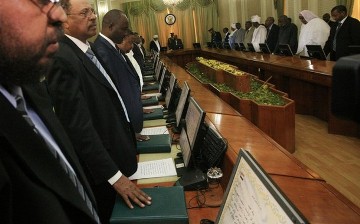Sudan’s new government sworn in
December 10, 2011 (KHARTOUM) – Members of Sudan’s new government took the oath of office on Saturday before President Omer Al-Bashir boasted about what he termed as the representation of different political parties in the new lineup.

The announcement of the cabinet was delayed for four months pending consultations with the opposition National Umma Party (NUP) of former Prime Minister Al-Sadiq al-Mahdi and the Democratic Unionist Party (DUP) led by Mohamed Osman Al-Mirghani to bring them into the cabinet.
The NUP rejected participation and vowed to adopt “civil disobedience”, but the DUP agreed at the eleventh hour to join amid a strong internal opposition to the decision.
Eleven NCP ministers retained their positions in the ministries of defense, interior, foreign affairs, Presidency of the Republic, petroleum, justice, finance, higher education, science and technology, minerals, electricity and dams, agriculture and labour.
The DUP was given three portfolios: the ministry of commerce, the ministry of council of ministers and the ministry of youth and sports.
Other breakaway factions of the DUP and the NUP were given six portfolios. The new cabinet also features four members of a breakaway faction of the Sudan People’s Liberation Movement North (SPLM-N), which is fighting the government in the Border States of South Kordofan and Blue Nile.
Unlike previous official reports on slashing the number of portfolios in order to reduce expenditure, the new cabinet maintained the same number of 32 portfolios, each of which contains a federal minister and a state minister.
A statement carried on Saturday by Sudan’s official news agency reported that Al-Bashir had issued a number of decrees appointing the new ministers.
On the same day, the 60 ministers took oath before Al-Bashir who directed them to work in tandem in order to achieve the peoples’ aspirations of prosperity, development and peace.
“We have waited for long in a bid to involve the biggest number of the political forces in the new government and we have succeeded in that with involving most of the political forces except the ones which rejected,” Al-Bashir said.
On their part, the new ministers vowed to make the new “broad-base” government a success.
Meanwhile, the NUP issued a statement criticising the formation of the new government.
“The biggest failing is the absence of a declared political program which means the continuation of the old NCP’s program which created the crises,” the party of former Prime Minister Al-Sadiq al-Mahdi said.
Ex-Darfur rebel group slams delay in appointing its ministers
In a related context, the Liberation and Justice Movement (LJM), the former rebel group from the western region of Darfur, has blamed the government for the delay in appointing three of its members to the new cabinet in accordance with the Doha agreement it signed with Khartoum in mid-July.
The LJM’s official spokesman, Ahmed Fadul, said that consultations between his group and the government were responsible for the delay in announcing LJM’s appointees.
Fadul reminded the government that the implementation of the Doha agreement was tied to a time frame, urging the government to adhere to its obligation in order not to affect the implementation of the agreement.
The Doha agreement stipulates that the LJM be accorded the position of a federal minister and two state ministers.
It is believed that the movement will be given the position of a federal minister of health which was not included in the newly announced cabinet.
(ST)
